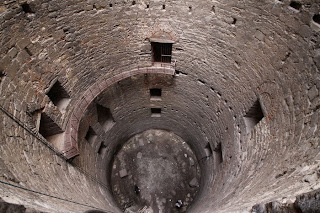We roleplayers sometimes use words in weird ways.
Take the universally maligned ‘railroad’.
In the real world, railroads have multiple tracks and bristle with
straight-aways, switchbacks, loops, tunnels, bridges and dead-ends, all to get passengers
somewhere quickly. Call of Cthulhu is often called out for railroadey
adventures, with Horror on the Orient Express often cited as one of the worst.
But ‘Horror’ takes the adventurers from London
to Constantinople and back at a breakneck pace
– hardly ‘going nowhere’.
Generally, a passenger has bought a ticket
before boarding a train, and has acquiesced to both the length of the ride and
the destination. If a gamer feels railroaded, he has gotten on the wrong train,
and so it is with ‘Horror’. A passenger always has the freedom to get off a
railroad, and can go whatever direction they want. They won’t travel as fast,
and they might not find anything interesting. If the train leaves without them,
so does the engine of the story.
That being said, I am sure there are plenty
of ‘one-track railroads’ out there. In that case, it is up to the gamemaster to
flesh out the adventure with sidetracks, switchbacks, loops and all other ‘Jacquaying’
options she can. But is also up to players to verify they have bought tickets
on the right train, and to change plans if they haven’t.
What us gamers call ‘railroading’ should
probably be called ‘one-tracking’, but this type of misnomer has a way of
sticking around.
On the contrary, for all the talk of free exploration
in ‘open dungeon environments’, a dungeon literally takes you nowhere. Dungeons
were places where prisoners, often villains, lingered, forgotten, then
generally weakened and died faster the further down they were sent. Games have
inverted this, making dungeon delving freebooters into stronger and more indelible
heroes as they descend deeper into the bowels of the earth. The word dungeon
comes from ‘dominated place’, but most dungeons are free-wheeling environments
filled with wandering monsters and fighting factions. Maybe ‘The Lost City’ and
‘Escape from the Slave Pits’ are the truest dungeons in the original sense of
the word. Dungeon could also be used to mean a cell in a tower, but that usage
is unheard of in gaming.
The dungeon also gives you the illusion of
space and depth because you have to map and clear every square, when most are
no bigger than your average mall or megachurch. In Temple of Elemental Evil,
the Moathouse is barely 150 feet (30 meters) square, and the measly six floors
beneath only bump this up to 200 feet (66 meter) square.
Of course, the limitations of paper width
affected dungeon size, and I remember drawing a huge lost gnomish city on a
meter wide architectural or navigational graph sheet I got from somewhere in my
teens. But might the limitation also be conceptual? Maybe anything larger than
a sheet of paper is too much for us to handle. Witness the popularity of the
One Page Dungeon contest and the abortive Gigacrawler RPG of Zak S.
Why do gamers feel more free in a dungeon
than an infinite open world?
What about the venerated sandbox then?
Sandboxes are known for starting as nothing, empty frames that require human
action to give the raw dirt that lines them form and function. They are places
where children bring and forget their toys, where they fight and make one
another laugh or cry, and which the next rainstorm wipes clean.
From Greyhawk to Dwimermount, the sandboxes
we have seen are those already played through by others, and littered with
their sand castles, battlefields, and dropped toys. Has there ever been a game
that provided the raw, inchoate stuff of chaos from which players could fashion
their own castles and roads, and run their toy cars and people along? Could we
handle such a game if it did exist, or do we need the pegs of Hommlet and the Underdark
to hang our imaginary gaming hats on? I suspect that we do, but the call of
that blank space is still there, which is why we explore. I used to let players
decide the name and size of every community they encountered, and only after
working a few ‘Bumvilles’ and ‘Newtropias’ out of their system did they start
breathing life into interesting locales.
Is roleplaying in general and fantasy
gaming in particular the closest our rigid adult minds can get to the free
imaginative play of youth? Is that why we love and take it so seriously?
I wonder.



No comments:
Post a Comment